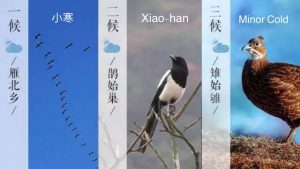
(Globe Language) (noun) 小寒 (Chinese): Minor Cold (23rd solar term), literally in Chinese “Xiao” 小 = small, “Han” 寒 = cold.
Example:
In the ancient Chinese calendar also known as the “agriculture calendar”, Xiao-han is one of the 24 solar terms which later spread to many Asian countries. Xiao-han is the 23rd solar term and 12th intercalating month (initial). Xiao-han begins when the Sun reaches the celestial longitude of 285° and ends when it reaches the longitude of 300°. Xiao-han more often refers in particular to the day when the Sun is exactly at the celestial longitude of 285°. In the Gregorian calendar, Xiao-han usually begins around 5 January and ends around 20 January of each year. Xiao-han is the coldest season in winter (if not during Da-han) because it is around the “third ninth days” cycle in winter. Chinese old saying: “People walk on the ice during winter’s third-ninth days and forth-ninth days” (三九四九冰上走). Since ancient China, Xiao-han was divided into 3 periods. The ancient Chinese believe that during the first period, 雁北乡; wild geese began to move north, in the second period 鹊始巢; magpies started building nests, and the last period 雉始鸲; pheasants began to tweet.
Since ancient times, Xiao-han has been a solar term for agricultural purposes in the lunar calendar. Xiao-han is still remembered and celebrated as a Chinese traditional festival.
